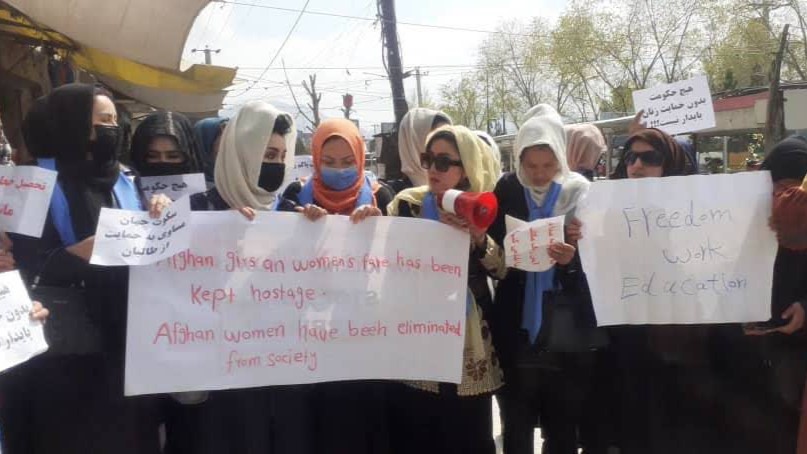The United Nations Assistance Mission in Afghanistan (UNAMA) has released a report highlighting the ongoing human rights violations in the country from May to June 2023.
The report sheds light on various areas where the Taliban continues to restrict the rights and freedoms of Afghanistan citizens, particularly women and girls.
The rights of women and girls remain severely constrained under the Taliban, the report says.
The Taliban’s Ministry of Public Health recently announced that only male medical students would be allowed to pursue further specialized medical studies, excluding female students from these opportunities, the report says, adding that this follows previous bans preventing women from participating in medical school exit examinations and attending university.
UNAMA has documented instances where the Taliban has enforced limitations on women’s freedom of movement and employment. For instance, two Afghan female staff members of an international non-governmental organization (INGO) were arrested at an airport for traveling without a mahram (male companion) on May 1.
In another case, on June 3, a midwife was detained and interrogated for five hours, with threats of death if she continued her work with an INGO. She resigned two days later due to the intimidation, the report says.
There have been reports of physical violence and intimidation against women, the report says.
In one incident, members of the Taliban’s Department for the Propagation of Virtue and Prevention, or vice and virtue department, beat a woman with a stick and forced her to leave a public park, said the report.
Taliban has also interfered in NGOs led by women or employing them, with seizures of assets and license suspensions, the report says.
The restrictions on women in Afghanistan working with the United Nations continue to impede the organization’s efforts. Since April 5, 2023, all Afghan UNAMA staff, both men and women, have been required to work from home, creating a discriminatory approach in the workplace, said the report.
The report also highlights the impact of improvised explosive devices (IEDs) on civilians.
Despite a reduction in overall civilian casualties, UNAMA has recorded significant levels of harm caused by indiscriminate IED attacks.
The majority of civilian casualties were attributed to Daesh’s Khorasan branch. Victims of these attacks face challenges in accessing essential support due to the ongoing financial and economic crisis, says the report.
The report addresses other concerning issues, such as corporal punishment, extrajudicial killings, and restrictions on media freedom.
Instances of public lashings and the death penalty have been documented, with individuals convicted of crimes subjected to these punishments, says the report.
UNAMA has also recorded arbitrary arrests, detentions, and ill-treatment of journalists, as well as restrictions on beauty salons and activities carried out by the Taliban’s Ministry for the Propagation of Virtue and Prevention of Vice.
Taliban has a responsibility to respect and ensure the rights of all individuals in Afghanistan, suggests UNAMA in the report.
Investigating past incidents and implementing measures for protection are crucial steps toward preventing further human rights violations, UNAMA says.
The UNAMA report calls for urgent attention to these issues and emphasizes the importance of upholding human rights and promoting a safe and inclusive environment for all Afghanistan citizens.





